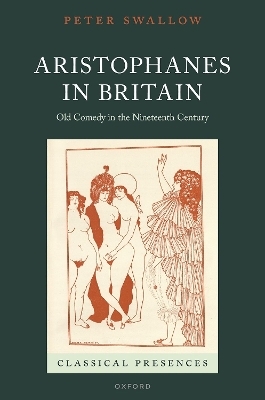
Aristophanes in Britain
Oxford University Press (Verlag)
978-0-19-286856-5 (ISBN)
In this lively and wide-ranging study, Peter Swallow explores the reception of Aristophanes in Britain throughout the long-nineteenth century, setting it in the broader context of Victorian Classicism and, more specifically, the period's reception of Greek tragedy. Swallow shows the surprising extent to which Aristophanes was repurposed across an array of mediums in Victorian Britain, and demonstrates that Aristophanic reception in the period was always a process of speaking to contemporary issues--making Old Comedy new.
The book examines two strands of Aristophanic reception: the political and the aesthetic. From the start of the long-nineteenth century, the British reception of Aristophanes tied into contemporary political debate, as historians, translators and commentators, and even the burlesque writer J.R. Planché activated Aristophanes in support of their own political positions. But each writer's conceptualisation of Aristophanes was as different as their political outlooks. While many writers who appropriated Aristophanes for their cause were Tories, a notable outlier is Percy Shelley, whose Aristophanic drama Swellfoot the Tyrant activated Old Comedy to argue for democratic republicanism--what we would now call a left-wing political revolution.
The second strand of Aristophanic reception, which developed from around the middle of the nineteenth century, actively depoliticised Old Comedy and instead received it through an aesthetic lens. The aesthetics of Aristophanes--with an emphasis on the beautiful and the archaeological--also lay behind school and university productions of Old Comedy during this period.
These strands of nineteenth-century Aristophanic reception find synthesis towards the book's conclusion. Edwardian women's receptions of Aristophanes show how activists used his plays to argue for equal educational opportunities and the right to vote. In the final chapter, Gilbert Murray and George Bernard Shaw's receptions reveal both the political and artistic potential of Aristophanes.
Peter Swallow is a Research Fellow at the Department of Classics and Ancient History, Durham University, working on the popular reception of Aristotle. Previously, he held a postdoctoral position at the Centre for Hellenic Studies, King's College London, and taught at both KCL and Goldsmiths. He edited Aristophanic Humour with Edith Hall (2020). Peter has also taught at Notting Hill and Ealing High School, and since 2017 has worked with the Advocating Classics Education project to expand access to classical education in schools.
List of Illustrations
1: Introduction
2: Out of Exile: Thomas Mitchell and John Hookham Frere
3: Swine before Pearls: Aristophanes at Play in Shelley's Swellfoot the Tyrant
4: Aristophanes Burlesqued: Planché's Birds and Victorian Popular Theatre
5: W.S. Gilbert, The English Aristophanes
6: The Glory and the Shame: Debating the Aesthetics of Old Comedy
7: Aristophanes in the Phrontisterion: Performances of Old Comedy at Schools and Universities
8: Women's Aristophanes: Old Comedy and the Fight for Gender Equality
9: Towards a Modern Aristophanes
10: Conclusion
Bibliography
| Erscheinungsdatum | 13.09.2023 |
|---|---|
| Reihe/Serie | Classical Presences |
| Zusatzinfo | 30 black and white images |
| Verlagsort | Oxford |
| Sprache | englisch |
| Maße | 160 x 240 mm |
| Gewicht | 638 g |
| Themenwelt | Geschichte ► Allgemeine Geschichte ► Neuzeit (bis 1918) |
| Geisteswissenschaften ► Sprach- / Literaturwissenschaft ► Anglistik / Amerikanistik | |
| Geisteswissenschaften ► Sprach- / Literaturwissenschaft ► Literaturgeschichte | |
| Geisteswissenschaften ► Sprach- / Literaturwissenschaft ► Literaturwissenschaft | |
| ISBN-10 | 0-19-286856-X / 019286856X |
| ISBN-13 | 978-0-19-286856-5 / 9780192868565 |
| Zustand | Neuware |
| Haben Sie eine Frage zum Produkt? |
aus dem Bereich


